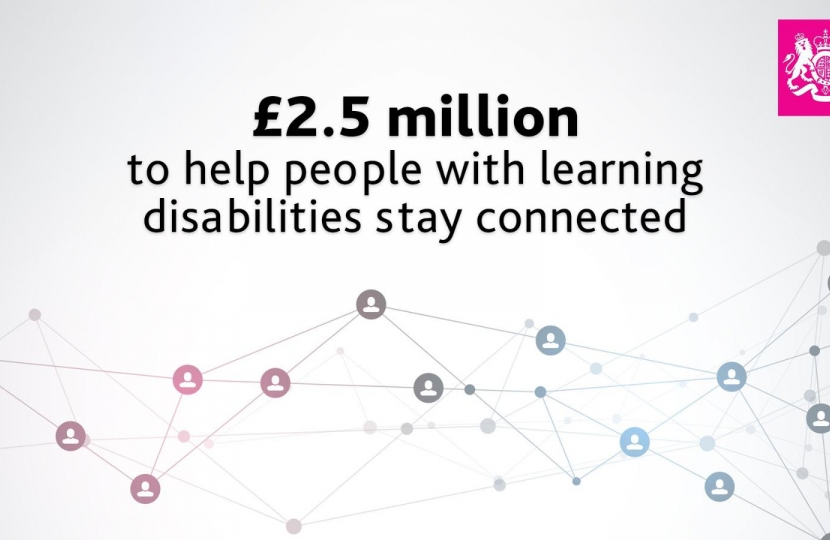
- £2.5 million Digital Lifeline fund set up to improve lives of thousands with learning disabilities on low incomes
- 5,000 internet tablets preloaded with data and free tech support available from March
- Devices to help recipients beat loneliness by reconnecting them with friends and family
The government has set up a £2.5 million fund to provide devices, data and digital support to people with learning disabilities who can’t afford to get online.
The new Digital Lifeline scheme will fund 5,000 internet tablets preloaded with data and free tech support for those facing a combination of digital exclusion: cost as a barrier to internet access and increased social isolation caused by coronavirus.
It comes as recent ONS data found three in four people (74.6 per cent) with a learning disability believe their wellbeing has been affected by the impact of coronavirus, compared with 37 per cent of non-disabled people.
Studies have shown technology can help people with learning disabilities reduce feelings of loneliness and support their mental health and wellbeing. The fund will ensure thousands facing financial hardship can enjoy the many benefits offered by technology and lead as normal a life as possible while restrictions are cautiously eased following the roadmap published by the government on Monday.
Digital Minister Caroline Dinenage said:
The pandemic has been incredibly tough for disabled people who have struggled to get online for basic things like catching up with loved ones.
The Digital Lifeline fund will tackle this divide head on by putting thousands of devices in the hands of those who need them most, with free data and tech support on standby to help people with learning disabilities.
The first devices will be delivered from March and form part of a wide package of measures the government has taken to support disabled people during the pandemic, including making £4.6 billion available to local authorities to ease pressures on local services including adult social care and giving £1.2 million to seven learning disability and autism charities.
The government is working on the project with leading digital inclusion charities Good Things Foundation and AbilityNet, both highly experienced in helping disabled people boost their mental health and achieve their goals through digital technology.
Isobel has a learning difficulty and lives with her dog but was feeling very isolated due to Covid-19. However, with the help of AbilityNet volunteer, Chris Grant, she has embraced technology to keep in touch with family and friends despite social distancing measures.
Isobel, 31, from Alness, Scotland, said:
Chris linked me in with a local charity to obtain a tablet and AbilityNet’s team of volunteers showed me the best way to use it, and how to use it safely.
The best thing about tech is keeping in touch with friends and family via messenger and Facebook. It also keeps me entertained by looking at things such as Instagram.
I’m gaining more confidence and will be supported by Chris from AbilityNet to learn more so I can do more with my tablet. Having my tablet and phone makes such a huge difference and can keep in touch with friends.
AbilityNet will support the Digital Lifeline fund by providing tech advice on assistive technologies and accessibility assessments for individuals with multiple and/or profound disabilities. Good Things Foundation will provide support and guidance for the local organisations to help them distribute the devices safely and securely.
Funding will also be provided for local organisations to provide support to help recipients learn how to use their device safely and confidently.
Gary Moore, CEO of AbilityNet, said:
Covid has shown how access to technology is a vital part of an independent and fulfilling life for everyone in the community.
AbilityNet has been helping disabled people harness the power of tech for over 20 years and the Digital Lifeline project offers a wonderful opportunity to help people with learning disabilities get their hands on tech which will transform their lives.
Helen Milner, CEO of Good Things Foundation, said:
This investment from the Department for Digital, Culture, Media and Sport, giving digital access and skills to people with learning disabilities, couldn’t have come at a more important time.
The Covid-19 pandemic continues to highlight just how essential being online is for day-to-day living. But millions of people are still on the wrong side of the digital divide.
People with learning disabilities face even more challenges. Staying connected is an essential lifeline they depend on and must not do without.
That’s why we’re exceptionally proud to be working with DCMS on Digital Lifeline and we’re excited to be partnering with AbilityNet, and other amazing organisations across the UK, to get devices and data into the hands of people who need help the most. Together we can all help fix the digital divide.




